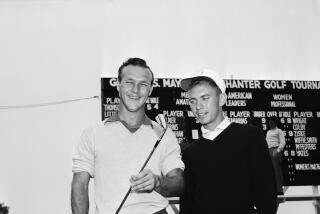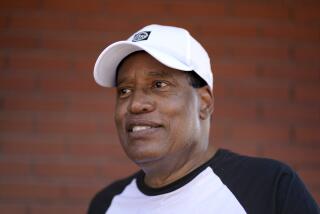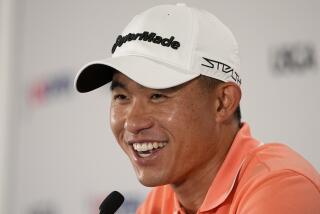The ‘Elder’ Statesman’s Dramatic Return to Game of Golf
- Share via
WASHINGTON — Lee Elder gives thanks.
A year ago, the night he finished playing the Gus Machado Classic in Florida on the seniors golfing circuit, Washington’s Elder was hit -- and hit hard -- by a heart attack. He had played the tournament with all the warning signs, but failed to recognize them. Packing for a trip home to spend Thanksgiving with his wife Rose, he was literally felled.
Remarkably, Elder, 54, came off the final hole of this year’s Gus Machado Classic last Sunday feeling great. He hadn’t had a pain. Even more, a year to the week of what might have been his last tournament, Elder shot a sensational final-round, six-under-par 65 to win the Machado and $45,000 by five strokes. His timing was exquisitely ironic, his swing as true as ever. He was back.
Lying in intensive care, Elder looked up at his doctor who pronounced an uncertain future.
“He said, ‘You’re going to have to take it easy. Your golf career is in jeopardy.’
“I had told him I would like to play in the (seniors) PGA, which was in February. He said, ‘You just had a heart attack. How can you be thinking about golf now?’
“I said, ‘That’s my profession.”’
As Elder has said before, “I think that if I had to go away from golf, not be able to play and compete, it would be awfully hard for me.”
He was not ready to meet, as John Updike has put it, “the little death that awaits athletes” -- quitting.
“The one thing I want to do,” he told the doctor, “I want to play golf again.”
Elder was seated in his wife’s chair in her K Street office Wednesday. Rose Elder directs several enterprises under the Elder Group, including sports marketing and management, the Lee Elder Scholarship Fund and an institute focusing on job opportunities for minority youth in sports. She is her husband’s business manager. Lee Elder isn’t any more comfortable behind a desk than he was in intensive care. He held on to a putter.
He is a stocky man, 5 feet 8 1/2 inches, 189 pounds -- down from 214, and falling. His arms are thick, noticeably so when he leans forward and puts them on the desk. So are his shoulders; sloped forward, they have always seemed to compress his swing, keeping it unerringly in a groove.
He has been, in particular, a premier iron player. When he reached the last hole of the Machado, a driving hole, he went to his 2-iron to protect his lead. Then he used a 3-iron to the green. While his two closest rivals drove into trouble, Elder brought in his eighth seniors victory with two swings that seemed so effortless.
Winning the Machado after thinking he was dying following the last one?
He calls the experience “reliving life.”
Now he has to diet, exercise and take medication. He cannot smoke. He used to be a two-packs-a-day man. In 1968, when he took Jack Nicklaus five playoff holes in the American Golf Classic, an aptly named battle between a Jackie Robinson of the links and perhaps the greatest of them all, he remembered, settling deeper into the big leather chair, laughing and sorry at the same time, “I was probably smoking three packs a day then. I was a youngster then.”
He’s as sorry as he can be about all those smokes. How he used to flick away a cigarette before taking his driver. Or setting down a butt on clipped grass before putting. Sometimes picking it up, other times lighting up anew on the way to the next tee.
Then, “The way I was hurting -- it was so painful I didn’t know what to expectl” said Elder. Friends in a condominium close to his in Pompano Beach, Fla. had called paramedics. They had treated him before even moving him. Then, they took him in. He was scared, he admits.
He said what a man in his position would say after the doctor sets the rules, all strict.
“Whatever it takes, Doc.”
Because it was “some experience. One of the most frightening, one of the most severe pains. I feel very lucky. I know people who have had heart attacks and been unable to continue in their profession. I think this is a warning sign to make a change, a change my lifestyle.”
Besides the cigarettes, “I must have drunk five or six cans of beer a day. Overweight. Just ate all kinds of food. Ate at odd hours. Hey, that’s totally wrong.”
Reliving life has gotten him out of golf carts. On the over-50 seniors tour, a player can ride. Elder used to. Now he walks the first nine holes. Twelve or 13 if he’s feeling strong. He’s feeling stronger week by week.
As he had hoped, he began his comeback in the PGA seniors, finishing tied for 12th. He was accompanied by his doctor, wife, sister-in-law, friends. Since, he’s done it on his own, earning about $160,000 this year on his limited schedule with two tournaments left in Hawaii. In his first three years as a senior, he averaged $300,000.
The seniors tour came along at a just time for Elder. He had been shortchanged on the front end of his career.
Growing up in Dallas, Elder learned to play golf crosshanded. A black pioneer golfer, Ted Rhodes, changed him to a traditional grip. The year he had his dramatic shootout with Nicklaus, Elder was a “youngster” only in the sense that he was a PGA tour rookie. He was a rookie at the advanced age of 34. Earlier, racial barriers in golf had blocked his path.
He had made what money he could by hustling. Among other adventures, Titanic Thompson would sucker braggarts into playing his bag-toter, Elder.
Five years before the Nicklaus playoff, Elder didn’t have enough money to know for sure he’d make the next town. Between Chicago and East St. Louis, two tires on his car blew simultaneously. His possessions had dwindled to little more than one spare tire and a few dollars in his pocket. He needed a tow truck, and more.
“Is this the way it’s always going to be?” he asked, turning to Rose. “Is this the way it’s going to be farther down the road?”
He pushed on, becoming the first black to play in the Masters, earn $1 million on the regular PGA tour and make the Ryder Cup team, “the highlight of my career, to represent my country.” For 18 years, he has helped young men and women in their career goals with funds raised through the Lee Elder Invitational.
Now he’s living like one who’s heard the words, “The choice is going to be up to you, whether you want to live or whether you want to die.” Leaning way back, mentioning the difference a year has made for him, he said, “I put the good Lord into all my daily activities.” These include resisting the urge to smoke, when “you look around the room where you are, with other people, and you smell the cigarette smoke and it smells so good.
“‘No-o-o,’ I say. I’m trying to make the best of it.”
It’s all a man can do.
More to Read
Go beyond the scoreboard
Get the latest on L.A.'s teams in the daily Sports Report newsletter.
You may occasionally receive promotional content from the Los Angeles Times.










